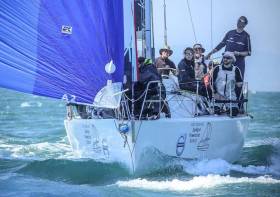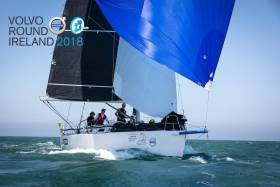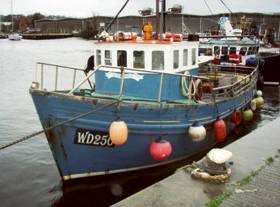Displaying items by tag: Man Overboard
Kenneth Rumball and John White are taking the Irish National Sailing and Powerboat School’s popular ‘man overboard’ lecture to the Royal Ocean Racing Club’s London clubhouse this evening (Thursday 16 May).
On 29 June 2018, the J109 yacht Jedi started the Round Ireland Yacht Race — but little did her crew of eight know that just says later, at 1am on 2 July, crew member John White would be swept overboard south-west of the Blasket Islands.
After well received talks at Wicklow Sailing Club in January and the Royal Irish Yacht Club in February, Rumball and White are in London to tell the story of how Jedi’s crew dealt with the situation — and what lessons were learnt from the incident.
Tonight’s RORC talk from 7pm is free for members and £10 for non-members, with booking available online HERE. For dinner reservations following the presentation email [email protected] or call +44 (0)207 493 2248.
Lecture: “Man Overboard Recovery-Volvo Round Ireland 2018”
#dublinbay - An illustrated lecture: “Man Overboard Recovery-Volvo Round Ireland 2018" is to be presented next week in Dublin by John White and Kenneth Rumball.
This final lecture in the present series, organised by Friends of Glenua is to be held on Thursday 25 April at 8pm. The venue as usual will be held at the Poolbeg Yacht and Boat Club located in Ringsend on Pigeon House Road.
There will be an entry contribution of €5 in aid of the RNLI.
Background on lecture
One o'clock in the morning of 2nd of July 2018, 30+ knots of a northerly wind off the Blasket Islands, pitch black, wild rain and freezing temperatures, and the call goes out "Man Overboard". The man swept overboard was John White, one of a crew of seven on board Jedi, with Kenneth Rumball, James Gunn, John White, Philip Connor, Lorcan Tighe, Kylie McMillan, Diarmuid McLaughlin and skippered by Michael Boyd.
Fortunately, the very experienced and highly competitive skipper and crew, were well prepared for the 2018 Round Ireland Yacht Race. John was recovered quickly and efficiently and participated fully in the rest of the race.
Still there are lessons to be learned from their first-hand experience. John and Kenny will share these in their illustrated presentation which has already been received enthusiastically by fellow sailors in other sailing clubs. On the eve of a new sailing season, it’s a timely reminder that bad sailing conditions are a threat to the best of crews requiring thorough preparation in boat skills and modern technology.
Marine Notice: Drills For Man Overboard Recovery On Fishing Vessels
The latest Marine Notice from the Department of Transport, Tourism and Sport reminds all concerned in the fishing industry of the existing requirements for drills and musters for man overboard recovery systems on all fishing vessels.
The legal requirements for these are laid out under the Merchant Shipping (Musters) (Fishing Vessels) Regulations 1993 SI No. 48 of 1993 and Merchant Shipping (Safety of fishing Vessels) (15-24 metres) Regulations 2007 SI No 640 of 2007.
These regulations require the skippers of fishing vessels to draw up muster lists for their vessels and exercise the crews of their vessels in the use of lifesaving appliances and firefighting appliances carried on their vessels.
The notice comes on the foot of a report published earlier this year by the Marine Casualty Investigation Board into a fatal incident involving the FV Kerri Heather in Arklow in November 2016.
Existing requirements in relation to drills/musters for vessels under 15m are included in Chapter 8.9 of the Code of Practice for the Design, Construction, Equipment and Operation of Small Fishing Vessels of less than 15m.
The skipper of every fishing vessel has overall responsibility for ensuring their crew know the location of the lifesaving and firefighting equipment on the vessel and are instructed, trained and drilled in the use of such equipment.
Full details of such skills — and the related DTTAS recommendations — are outlined in Marine Notice No 40 of 2018, a PDF of which is available to read or download HERE.
































































